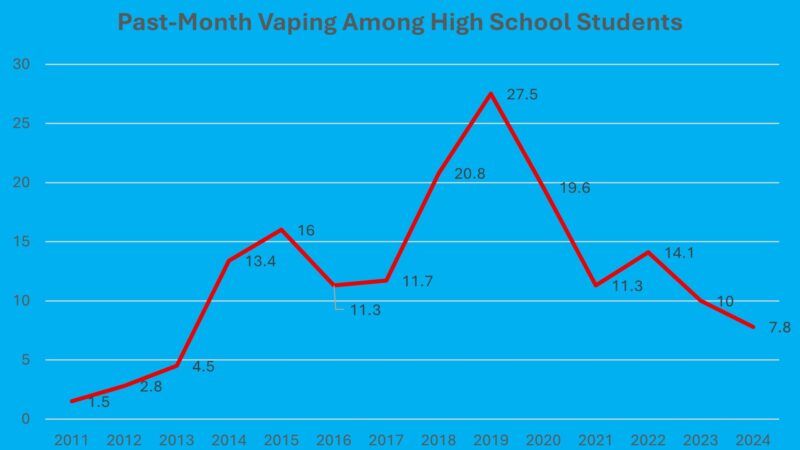Trump Promised To 'Save Vaping.' His FDA Head Does Not Seem Inclined To Do That.
Marty Makary grossly exaggerates the prevalence of adolescent nicotine addiction, the concern underlying his agency's restrictions on e-cigarette flavors.

During his 2024 campaign, President Donald Trump bragged that he "saved flavored vaping" during his first term and promised that he would "save vaping again." That promise was significant in light of the de facto ban that the Food and Drug Administration (FDA) had imposed on vaping products in flavors other than tobacco and menthol—a policy that rejects the varieties that former smokers overwhelmingly prefer. But recent comments by Marty Makary, the Trump-appointed FDA adminstrator, cast doubt on whether he is inclined to follow through on the president's commitment.
Testifying before a Senate appropriations committee last week, Makary hyped the threat posed by underage vaping, which is the rationale for the FDA's flavor restrictions. In comments he highlighted on his official X account, Makary averred that "there are high schools in America now where kids are saying half of the kids in high school are addicted to these vaping products." Whatever those students might be saying, that statement is hard to reconcile with the latest results from the National Youth Tobacco Survey (NYTS), which is conducted each year by the Centers for Disease Control and Prevention.
In the 2024 NYTS, 7.8 percent of high school students reported that they had used e-cigarettes during the previous 30 days. Yet Makary implied that 50 percent of students at certain high schools are "addicted to these vaping products," which is more than six times the nationwide prevalence of past-month use in the 2024 NYTS and about 22 times the rate of daily use (assuming 30 percent of past-month users were daily users, as in the 2023 survey).
Contrary to the impression that Makary left, underage vaping has fallen sharply in recent years. The prevalence of past-month use among high school students last year was down from 10 percent in 2023 and about 72 percent lower than the peak of 27.5 percent recorded in 2019.
Sen. Jeanne Shaheen (D–N.H.), who pressed Makary to explain what the FDA is doing to curtail e-cigarette use by teenagers, dishonestly obscured that dramatic decrease in underage vaping. "One of the things that I've been concerned about for a very long time is the increased use of vaping by young people," she said. "The numbers have gone up dramatically in the last 10 years."
That is not true: According to the NYTS, the prevalence of past-month e-cigarette use among high school students last year was less than half the rate recorded in 2015. Yet that whopper paled beside the one that Shaheen told in January 2024. "We've all seen the statistic that teenage e-cigarette consumption has increased by 1,800% in just the last year," she said.
That figure actually refers to the increase in past-month use between 2011 and 2019. The 2023 number was already down 64 percent from that peak, and the rate fell again in 2024. Yet last year Shaheen insisted that "e-cigarettes continue to be an epidemic among our youth."
Far from correcting the record, Makary echoed Shaheen's alarm. "There are kids in America today who are addicted, they know they're addicted, they come from good families, they're good kids, and they can't stop," he said. "And that is something that we have to address."
Makary bragged about the FDA's seizures of illegal, Chinese-made vaping products that "are designed to get kids addicted." In the past, he said, the FDA had blocked imports of those products at one port but failed to confiscate them, with the result that they would enter the country at another port.
"It's been a joke, and they've been laughing at us," Makary told Shaheen. "And so we are going to stop that….We've got to get serious about them."
Whatever the merits of seizing those particular products, it is notable that adolescent vaping dropped sharply during the same period when Makary says the FDA was falling down on the job. But Makary did not have to address that puzzle because he did not even acknowledge the downward trend. To the contrary, Makary implied that underage addiction to vaping products is rampant, offering an estimate that is blatantly at odds with the government's own numbers.
Shaheen, a longtime critic of the vaping industry, was visibly pleased by Makary's attitude. "I agree," she said. "I think we should right-out ban vaping products—for anybody under a certain age, certainly." Since the federal government already prohibits e-cigarette sales to anyone younger than 21, Shaheen must have in mind a more ambitious form of prohibition. Yet Makary said nothing about the right of adults to purchase these products.
Nor did Makary object when Shaheen dismissed the enormous harm-reducing potential of vaping products. "One of the other selling points that they use is [that] it's a way to get cigarette users to stop smoking," Shaheen said. "They can vape, and the harmful impacts are not as serious." Although she implied that "selling point" was fraudulent, the FDA itself has repeatedly acknowledged the evidence that vaping is a much less dangerous form of nicotine consumption than smoking.
Despite that concession, the FDA during the Biden administration refused to approve vaping products in the flavors that are most popular among former smokers—a policy that the Supreme Court greenlighted last month, when it rejected a challenge to those denials. That decision put the ball back in the FDA's court.
If the FDA reconsiders its flavor ban, as Trump said it would, manufacturers of vaping products will be free to supply the e-liquids that adult consumers demonstrably want. But Makary's gross hyperbole about the prevalence of adolescent nicotine addiction suggests he is not inclined to do that.
